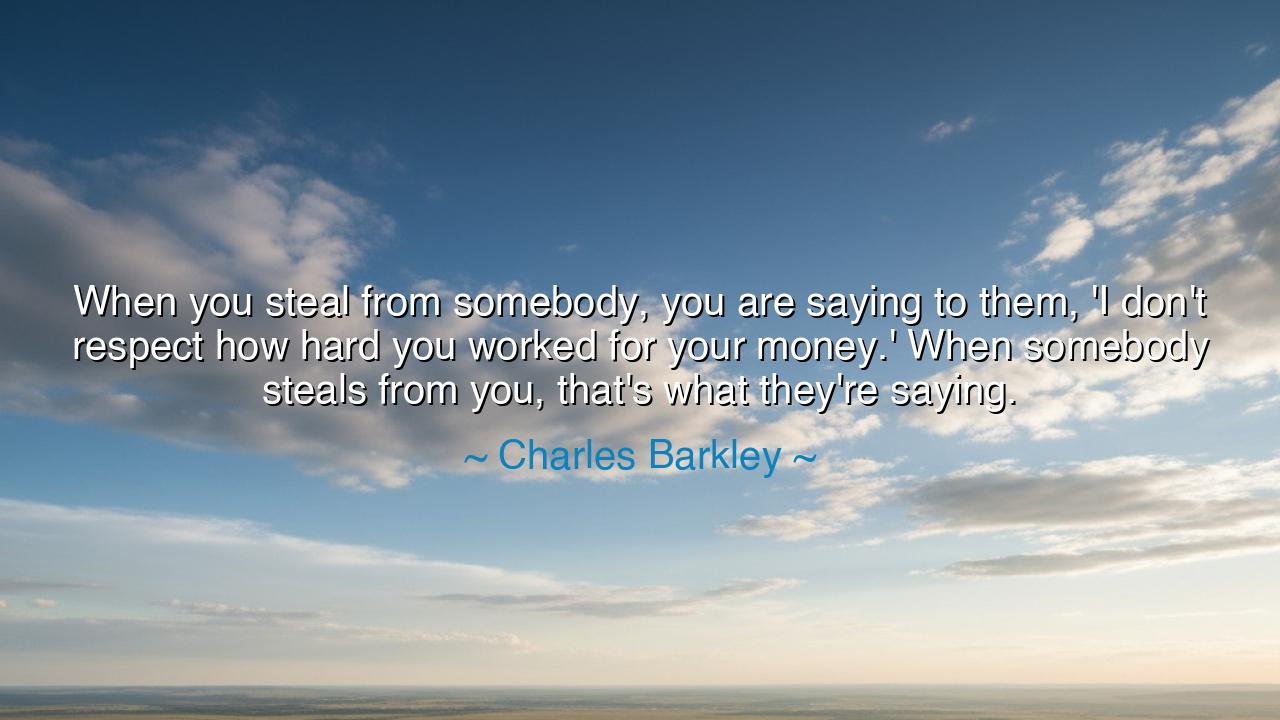
When you steal from somebody, you are saying to them, 'I don't
When you steal from somebody, you are saying to them, 'I don't respect how hard you worked for your money.' When somebody steals from you, that's what they're saying.






When Charles Barkley said, “When you steal from somebody, you are saying to them, ‘I don’t respect how hard you worked for your money.’ When somebody steals from you, that’s what they’re saying,” he was not simply talking about theft — he was speaking of respect, honor, and the moral bond that holds society together. His words echo the wisdom of the ancients, who taught that to take what belongs to another is not only a crime of possession, but a crime of the spirit. For when one steals, one does not merely seize a thing of value — one tramples upon the sweat, sacrifice, and dreams that created it. Barkley’s truth is simple, yet eternal: that labor is sacred, and to dishonor it is to strike at the very dignity of humanity.
In this quote, Barkley transforms a lesson from the courts of sport into a reflection on the courts of life. A man or woman’s money is not just paper or coin — it is a symbol of the hours they have given, the struggles they have endured, and the hopes they have pursued. To steal from another, then, is to say, “Your effort means nothing to me. Your humanity is less than mine.” It is to deny the invisible story that lies behind every earned dollar — the missed meals, the sleepless nights, the perseverance through failure. This is why theft wounds more deeply than loss of property; it is a wound to the soul, a message of contempt for one’s work and worth.
The origin of Barkley’s insight lies in his own journey — one shaped not only by fame, but by struggle and discipline. Born in the humble soil of Alabama, he rose through sheer effort, through hours of training and sacrifice, to become one of the most celebrated athletes of his generation. He knew firsthand that every achievement, every reward, was paid for with effort. Thus, his words are not spoken from theory but from lived truth. Having earned everything through toil and perseverance, he understood the profound injustice of those who seek to take without giving — who believe that what others built can be seized without respect. His words remind us that true wealth lies not in the possession of things, but in the honor of earning them.
The ancients, too, spoke of this sacred balance between effort and respect. In the Book of Proverbs, it is written: “The thief’s bread is sweet, but it turns to gravel in his mouth.” In Greek wisdom, the philosopher Aristotle declared that justice is giving to each what is due — and to take from another is to unbalance the harmony of the world. Even in the smallest village, theft was seen not as a private act, but as a wound to the community’s trust. For society stands upon invisible pillars — mutual respect, shared labor, and fairness. When one steals, those pillars crack, and the house of humanity trembles. Barkley’s modern words echo this ancient warning: that civilization survives only so long as we honor each other’s work.
Consider, for example, the story of Jean Valjean, the hero of Victor Hugo’s Les Misérables. Driven by hunger, he steals a loaf of bread to feed his sister’s children — a desperate act that leads to years of punishment. Yet even in this tale of injustice, the lesson endures: that stealing, though born of pain, violates the bond between souls. Later, when Valjean is shown mercy by a priest who forgives him, he learns that dignity cannot be taken — it must be restored through honest labor and compassion. Like Barkley’s quote, the story teaches that true respect for oneself and others begins with understanding the value of work, and the moral weight of every act that touches another’s livelihood.
There is also in Barkley’s words a profound call to empathy. When he says, “When somebody steals from you, that’s what they’re saying,” he invites us to see theft not only as loss, but as revelation. Those who steal reveal their own blindness — their inability to see the worth of another’s struggle. And those who are stolen from learn the depth of their own values: how they have labored, sacrificed, and earned. Thus, the pain of theft can awaken a deeper strength — the resolve to protect what is right, to teach respect where ignorance prevails, and to honor labor all the more fiercely.
The lesson of this quote, then, is both moral and practical. Do not take what is not yours, whether it be wealth, ideas, time, or trust. Honor the work of others as you would wish them to honor yours. In your dealings, let fairness be your shield and gratitude your guide. And when you earn — whether by the sweat of your brow or the creativity of your mind — remember that your reward carries not only value, but virtue. To respect effort is to respect life itself, for effort is the expression of the soul’s will to grow and create.
So let these words of Charles Barkley stand as a teaching for generations to come: To steal is to reject respect, but to honor labor is to uphold humanity. Let each man and woman remember that every coin carries a story, and every possession bears the imprint of someone’s time upon this earth. Therefore, treat all things — whether they belong to you or to others — with the reverence they deserve. For in respecting the work of another, you affirm your own dignity, and in protecting what is earned, you preserve the sacred balance upon which all human decency stands.






AAdministratorAdministrator
Welcome, honored guests. Please leave a comment, we will respond soon